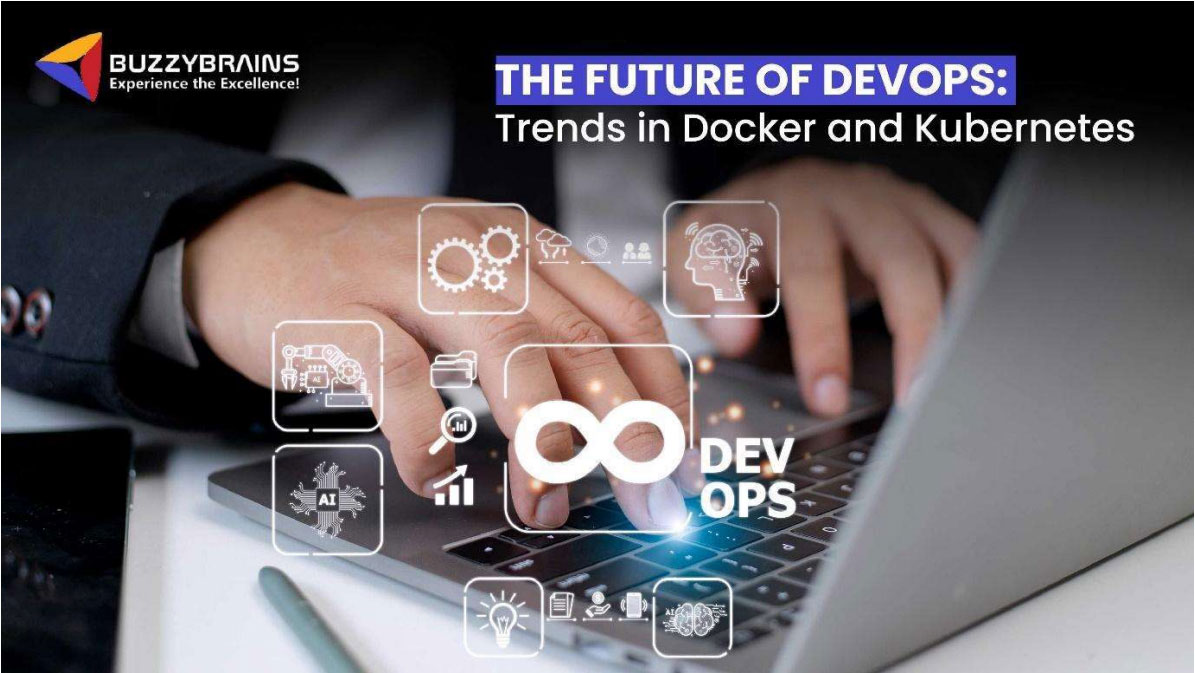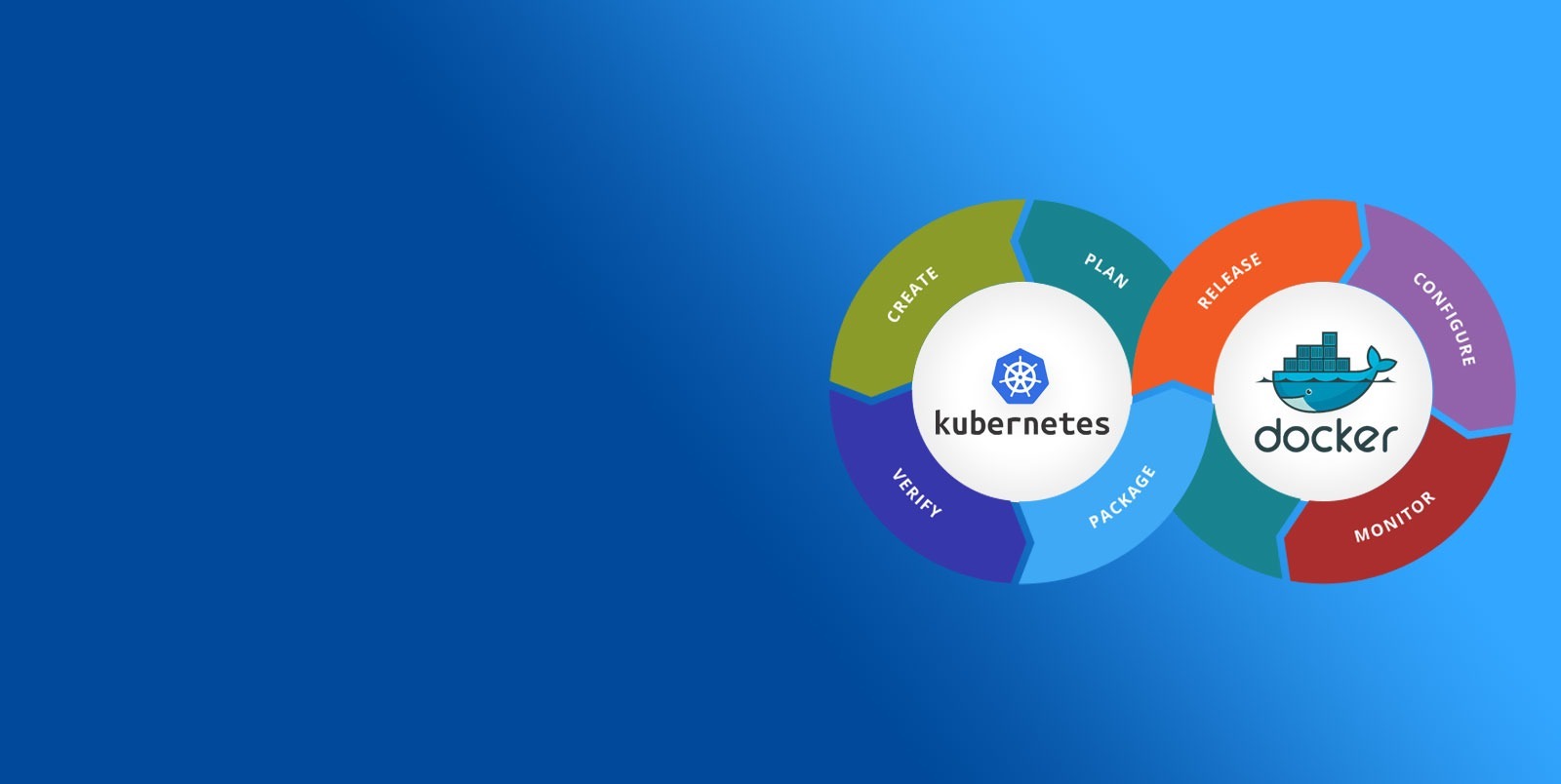The Future of DevOps: Trends in Docker and Kubernetes

Welcome to the cutting-edge world of DevOps, where technological marvels like Docker and Kubernetes are shaping the future of software development. Picture these tools as your trusty superheroes, revolutionizing the way applications are built, deployed, and managed.
In this blog, we’ll unravel the importance of containerization, explore the significance of Docker and Kubernetes, and dive into the key trends shaping their future.
- Importance of Containerization in the DevOps Landscape
- What is Docker?
- Key Future Trends in Docker
- What is Kubernetes and Its Role in Container Orchestration?
- Key Future Trends in Kubernetes
- Best Practices for Using Docker and Kubernetes in Tandem
- Common Challenges in Adopting Docker and Kubernetes
- FAQs about Trends in Docker and Kubernetes
- Conclusion
- Level Up DevOps with BuzzyBrains: Embrace Docker & Kubernetes Now!
Importance of Containerization in the DevOps Landscape
In the bustling advancements of DevOps, containerization stands as a game-changer. Imagine it as a superhero cloak, streamlining processes and enhancing efficiency. The importance of containerization unfolds in these key points:
1. Consistency: Containers ensure that applications run consistently across various environments.
2. Isolation: They encapsulate applications and their dependencies, preventing conflicts.
3. Scalability: Containerization allows for easy scaling, adapting to changing workloads seamlessly.
4.. Resource Efficiency: Containers share the host OS kernel, making them lightweight and resource-efficient.
5. Rapid Deployment: With containers, applications can be deployed quickly and consistently.
What is Docker?
Enter Docker, the superhero of containerization in the DevOps universe. Docker is not just a tool; it’s a transformative force. Here’s why Docker steals the spotlight:
1. Consistent Environments: Docker ensures consistency across development, testing, and production environments.
2. Dependency Management: It packages applications with their dependencies, eliminating compatibility issues.
3. Efficient Resource Utilization: Docker optimizes resource usage, allowing for better efficiency.
4. Fast Deployment: Applications in Docker containers can be deployed rapidly, reducing time-to-market.
5. DevOps Collaboration: Docker facilitates collaboration between development and operations teams.
Key Future Trends in Docker
As we gaze into the crystal ball of DevOps, several trends emerge in the Docker landscape:
1. Enhanced Security Measures: Docker will focus on bolstering security features to fortify containerized applications.
2. Greater Integration with Orchestration Tools: Docker is likely to integrate more seamlessly with orchestration tools for enhanced management.
3. Advancements in Networking: Expect improvements in Docker’s networking capabilities for better communication between containers.
4. Extended Multi-Cloud Support: Docker will continue its journey toward providing robust support for multi-cloud environments.
5. Streamlined User Experience: Future versions of Docker will emphasize a user-friendly experience with improved interfaces.
What is Kubernetes and Its Role in Container Orchestration?
Now, meet Kubernetes, the orchestrator of the DevOps symphony. It’s the mastermind behind managing and automating containerized applications. Here’s why Kubernetes is a crucial player:
1. Automated Scaling: Kubernetes automatically adjusts the number of container instances based on demand.
2. High Availability: It ensures applications are highly available by distributing containers across clusters.
3. Load Balancing: Kubernetes efficiently balances the load between containers, optimizing performance.
4. Declarative Configuration: Kubernetes allows the declaration of the desired state, handling the details of implementation.
Key Future Trends in Kubernetes
In the future landscape of Kubernetes, several trends are poised to shape its evolution:
1. AI-Driven Operations: Kubernetes will leverage AI for smarter decision-making and automated operations.
2. Edge Computing Integration: Expect Kubernetes to play a crucial role in managing applications on the edge.
3. Enhanced Security Features: Security will remain a top priority, with Kubernetes implementing advanced protective measures.
4. Simplified Cluster Operations: Kubernetes will focus on simplifying the management of clusters for improved efficiency.
5. Extended Support for Stateful Applications: Future versions will see better support for stateful applications and expanded Kubernetes use cases.
Best Practices for Using Docker and Kubernetes in Tandem
As you embark on your DevOps journey with Docker and Kubernetes, consider these best practices:
1. Start with Microservices: Design applications such as microservices to maximize the benefits of containerization.
2. Optimize Image Sizes: Keep Docker images small and efficient for faster deployment and resource utilization.
3. Regular Update Images: Stay up-to-date with security patches and feature updates for both Docker and Kubernetes.
4. Implement Resource Limits: Set resource limits for containers to prevent resource hogging and ensure fair usage.
5. Monitor and Analyze Performance: Regularly monitor the performance of Docker containers and Kubernetes clusters for efficient operations.
Common Challenges in Adopting Docker and Kubernetes
Despite their superhero status, Docker and Kubernetes come with a set of challenges:
1. Learning Curve: Adoption may be hindered by the initial learning curve, especially for teams new to containerization.
2. Resource Intensiveness: Running multiple containers and orchestration tools can strain resources, requiring careful planning.
3. Networking Complexities: Managing networking between containers and clusters can be complex, especially in large-scale deployments.
4. Persistent Storage Challenges: Handling persistent storage in containerized environments requires careful consideration.
5. Security Concerns: Ensuring the security of containers and orchestrators is an ongoing challenge that demands vigilance.
FAQs about Trends in Docker and Kubernetes
Q1. How does containerization with Docker contribute to the scalability of applications?
Containerization with Docker allows applications to be easily scaled by creating multiple instances of containers, adapting to changing workloads efficiently.
Q2. How does Kubernetes handle load balancing and ensure the high availability of applications?
Kubernetes automatically distributes traffic between containers, ensuring load balancing and high availability by running multiple instances across clusters.
Q3. What are the key advantages of using Kubernetes for container orchestration?
Kubernetes provides automated scaling, high availability, efficient load balancing, and declarative configuration, making it a powerful solution for container orchestration.
Q4. What are the best practices for monitoring and logging into a Dockerized and Kubernetes environment?
Best practices include implementing centralized logging, using monitoring tools, regularly reviewing logs, and setting up alerts for critical events.
Q5. What are the implications of the evolving landscape of container runtimes beyond Docker?
The evolving landscape beyond Docker signifies a shift toward alternative container runtimes, emphasizing improved performance, security, and compatibility.
Conclusion
As we conclude this exhilarating exploration into the future of DevOps with Docker and Kubernetes, it’s evident that these tools are not just trends; they are the architects of a transformative era.
Containerization has become the cornerstone of efficient, scalable, and resilient application development and deployment. Embrace trends, overcome challenges, and set sail into a DevOps future where Dockers and Kubernetes play a pivotal role in crafting success stories.
Level Up DevOps with BuzzyBrains: Embrace Docker & Kubernetes Now!
Ready to supercharge your DevOps game? Join hands with BuzzyBrains to unlock the true potential of Dockers and Kubernetes. Experience the seamless integration, enhanced efficiency, and unparalleled agility that these tools bring to your development and deployment processes.
The future of DevOps is now – dive in and lead the way with BuzzyBrains!
